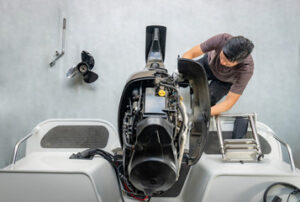Boating can be a relaxing, enjoyable hobby. But it is important to remember that boats have many dangers and require routine maintenance. If your boat smells funky, this could indicate a mold or mildew problem that requires repair. Also, if your toilet doesn’t work, this serious problem requires immediate attention.
 If your boat is a fiberglass vessel, you will eventually get small dings and scratches. These may seem like a small deal initially, but they can become serious problems if addressed. Addressing these issues as soon as possible is best to avoid potential water leaks or structural damage. To do this, knowing some basic boat repair skills is important.
If your boat is a fiberglass vessel, you will eventually get small dings and scratches. These may seem like a small deal initially, but they can become serious problems if addressed. Addressing these issues as soon as possible is best to avoid potential water leaks or structural damage. To do this, knowing some basic boat repair skills is important.
This tutorial will guide you through a 10-step boat repair hull patch project that will allow you to fix any cracks or holes on your vessel quickly and efficiently. First, you will need to prep the area of your hull, clean the surface and sand it down to roughen up the area so that the epoxy resin can adhere to it.
Once you have sanded the surface down, make sure that you do not leave any exposed fiberglass. This will prevent the resin from bonding to the existing fiberglass and causing additional delamination in the future.
Next, you will need to choose the type of resin to use in your hull repair. Epoxy resins are the strongest option but do not play well with polyester or gelcoat. Vinylester resin is an alternative option that will work better with these materials but is not as strong as epoxy.
If your damage is a hole that goes all the way through your hull, you will need to prepare a backing for your patch. To do this, cut a scrap piece of smooth plastic laminate or thin acrylic (Plexiglas) a foot larger than your damaged hole. Wrap this backer with parchment paper for a better hold and spritz it with polyvinyl alcohol (PVA) mold release. Once warmed, the PVA mold release will help the plastic or acrylic assume the correct curve of the surrounding hull for an even look.
If you notice that your engine is not working as it should, or that there are vibrations coming from the motor, this is a sign of an immediate problem. It is important to take your boat to a professional immediately when you notice such signs; this will ensure that the problem can be fixed before it gets worse.
A loss of power in your boat is always a bad thing, especially when you are out on the water. This could lead to dangerous situations, such as running out of fuel, or it may just mean that you have a major electrical issue that needs to be fixed right away.
Another thing to watch out for is if you notice that your boat is taking in more water than it is expelling. This is a major problem that can lead to expensive and extensive damage to your vessel, as well as potentially fatal results. It is crucial to call a boat repair expert as soon as you notice any type of water leakage.
If your steering wheel is hard to turn, this is also a bad sign and should be taken care of as soon as possible. This can indicate a mechanical failure or a faulty cable system that controls the steering wheel. It is recommended to keep all of your equipment or system repair information on hand, such as phone numbers, model numbers, and other details, so that you can provide the boat repair expert with as much information as possible in a timely manner.
The prop connects your engine to the water, and like your tires, it’s prone to damage. Abrasions, nicks, and other imperfections reduce the efficiency of your prop, leading to decreased boat performance.
In addition to the obvious problems — such as bent blades, which prevent them from engaging with water effectively — even slight damage to a propeller can impact rpm range, acceleration, and cornering. Propeller damage can also lead to a spindle-spindle problem that requires the replacement of the rubber or plastic hub that sits between the propeller and prop shaft. A good propeller shop can repair a spun hub, or if the prop is very old you may be better off with a new one.
To begin a propeller overhaul, the entire assembly is cleaned by bead blasting to remove all corrosion and paint. Once the prop is clean the machinists inspect the blades and hub for erosion, cracks, distortion, or other defects. They then grind the blade free of rock-nicks, and they measure all of the bores to make sure they’re correct. They also replace the propeller’s plastic hub insert, if necessary.
Next, the machinists recut the blade fillet and cold roll it. This procedure strengthens the fillet area. The machinists also use a technique called flame spraying to recondition the internal bore of the propeller control system. PPI is the only propeller company in the world using this technology, which saves customers significant cost.
Then the machinists weld back any damaged or missing blade areas. Then the prop is bead blasted to remove all weld and corrosion residue, and it’s repainted. Finally, the balancing machine removes weight from heavy blades to optimize the propeller’s operation.
Power issues are a common problem with boats. Whether you have a simple spark plug issue or a more complex electrical problem, it’s important to let a boat repair expert take a look at your boat’s wiring and circuitry to ensure your safety on the water.
Often, it’s a matter of corrosion from the elements that causes electric wires and connectors to stop working. When this happens, it’s crucial to have a boat repair expert handle the problem immediately as it can endanger your safety and that of your passengers. It’s also helpful to keep the technical support phone number for your boat’s equipment on hand for troubleshooting and repairs. You can even store it in your cellphone for instant access. It’s also a good idea to have a basic multimeter on hand.
Boat upholstery repairs are common jobs for boat mechanics. They often include work on seating, cabin furnishings and headliners. Marine vinyls are designed to withstand dampness, sunlight and hard usage. They are also rated according to cold crack, rub count and mold resistance. Upholstery is fastened with specialized marine-grade hardware and stainless steel staples that are resistant to corrosion.
Boat owners should regularly wipe down their seating to prevent dirt buildup, mildew and mold. They should also clean teak woodwork, such as handrails and steps, with a mild cleaner designed for this type of durable tropical hardwood.
If a boat smells musty or of mildew, it is a sign that there may be a serious problem, such as water leakage. It is best to get a professional marine repairman to inspect and diagnose the problem.
Most mechanics who specialize in boats are experienced, but they need a good working knowledge of mathematics and physics, along with the ability to understand blueprints and other instructions. They should be able to work with a wide range of tools and parts that can often be quite dangerous, so it is important that they are able to follow a clear set of guidelines for safety.
Mechanics who work in shops near bodies of water may be more likely to get regular work, but they can also find opportunities at yacht clubs and other boating destinations. If they have the necessary startup funds, skills and training, they can also start their own independent boat repair businesses. These business can be lucrative if they are located in an area that attracts wealthy, recreational boaters. This type of clientele can help these business owners to build up a steady stream of repeat business.
